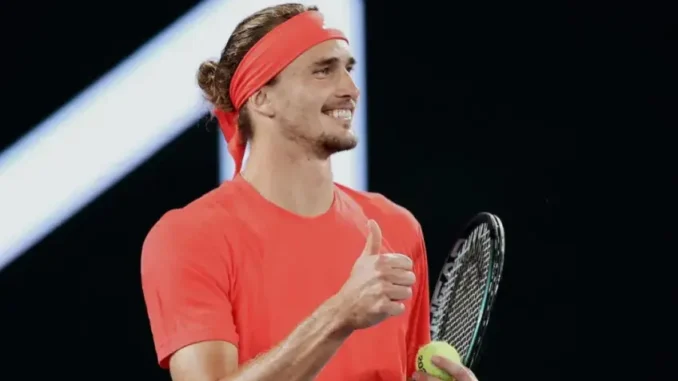
Alexander Zverev recently stirred the tennis world with his comments on Novak Djokovic and Carlos Alcaraz, playfully mocking the influence they seem to wield over the Australian Open board. Known for his outspoken nature, Zverev’s remarks have sparked widespread discussion about the dynamics between top players and tournament organizers, as well as the role of star power in shaping decisions in modern tennis.
Zverev’s lighthearted jab comes as both Djokovic and Alcaraz have been at the center of attention for their close relationships with key figures in the Australian Open’s management. While neither has openly flaunted their influence, their global appeal and status as two of the sport’s biggest stars naturally position them as significant stakeholders in the tennis world. For Zverev, this was an opportunity to add a touch of humor to an otherwise serious conversation about the power dynamics at play in major tournaments.
Djokovic, a nine-time Australian Open champion, has a storied history with the tournament and its organizers. Over the years, his dominance on the courts of Melbourne has been matched by his ability to draw massive crowds and headlines, cementing his place as one of the event’s most valuable assets. However, Djokovic’s influence extends beyond his performances. His involvement in player advocacy, such as his role in forming the Professional Tennis Players Association (PTPA), underscores his desire to have a say in the direction of the sport.
Carlos Alcaraz, on the other hand, represents the new generation of tennis stars. At just 20 years old, he has already captured the imagination of fans worldwide with his explosive game and infectious energy. Alcaraz’s rapid ascent to the top of the rankings has made him a key figure in the sport’s future, and tournament organizers are undoubtedly keen to nurture his involvement. For Zverev, the growing influence of players like Alcaraz highlights the changing dynamics of tennis, where younger stars are increasingly seen as central to the sport’s evolution.
Zverev’s comments were delivered with his trademark blend of wit and candor. He joked that Djokovic and Alcaraz seem to have a direct line to the Australian Open board, hinting at their ability to sway decisions or secure favorable conditions. While his remarks were meant in good humor, they also touch on a broader issue within professional tennis: the balance of power between players and organizers.
In recent years, the influence of top players in shaping tournament policies has become a topic of debate. On one hand, players like Djokovic and Alcaraz bring immense value to events through their star power, attracting fans, sponsors, and media attention. Their preferences and opinions often carry significant weight, as organizers seek to ensure their participation and satisfaction. On the other hand, some argue that catering too much to individual players risks creating an uneven playing field, potentially undermining the integrity of the sport.
Zverev’s remarks also serve to highlight the unique pressures faced by players who aren’t at the very top of the rankings. While stars like Djokovic and Alcaraz may enjoy certain privileges, others often have to navigate a more rigid framework, with less influence over key decisions. For players like Zverev, who are highly accomplished but not necessarily the face of a tournament, this dynamic can sometimes feel frustrating.
Beyond the humor, Zverev’s comments reflect his personality and approach to the sport. The German star has never shied away from speaking his mind, often using his platform to voice his opinions on various aspects of tennis. Whether discussing scheduling issues, court conditions, or player representation, Zverev’s willingness to engage with contentious topics has earned him both admirers and critics.
The broader context of Zverev’s remarks also raises questions about the role of governance in tennis. Major tournaments like the Australian Open operate within a complex framework, balancing the interests of players, sponsors, and fans. The involvement of players in decision-making processes is a relatively recent development, driven by the growing recognition of their importance to the sport’s ecosystem. However, finding the right balance between giving players a voice and maintaining impartiality remains a challenge.
For fans, Zverev’s comments offer a glimpse into the behind-the-scenes dynamics of professional tennis. While the sport is often portrayed as an individual pursuit, it is shaped by a web of relationships and negotiations between players, organizers, and other stakeholders. Understanding these dynamics adds a layer of intrigue to the spectacle on the court, reminding us that tennis is as much about strategy off the court as it is about skill and determination during matches.
As for Djokovic and Alcaraz, both players have chosen not to respond directly to Zverev’s remarks, maintaining their focus on their respective preparations for the Australian Open. For Djokovic, the tournament represents an opportunity to extend his dominance and pursue yet another title in Melbourne. Alcaraz, meanwhile, will be eager to continue building on his impressive trajectory, proving that he belongs among the sport’s elite.
Zverev, too, will have his sights set on making an impact at the Australian Open. The German has faced his share of challenges in recent years, including injuries and periods of inconsistency, but remains one of the most talented players on tour. His ability to blend humor with sharp observations adds a unique dimension to his presence in the sport, endearing him to fans and keeping him in the spotlight.
Ultimately, Zverev’s playful mocking of Djokovic and Alcaraz is a reminder that tennis, for all its intensity, is also a sport filled with personalities and moments of levity. His remarks inject a sense of fun into the lead-up to one of the year’s biggest tournaments, reminding us that behind the competition lies a vibrant community of players who share mutual respect and camaraderie. As the Australian Open approaches, fans will be eager to see how this dynamic unfolds both on and off the court.
Leave a Reply